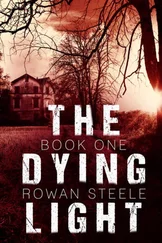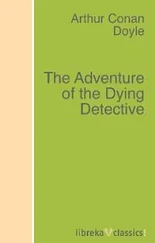Maureen JENNINGS - Except the Dying
Здесь есть возможность читать онлайн «Maureen JENNINGS - Except the Dying» весь текст электронной книги совершенно бесплатно (целиком полную версию без сокращений). В некоторых случаях можно слушать аудио, скачать через торрент в формате fb2 и присутствует краткое содержание. Город: Toronto, Год выпуска: 1997, ISBN: 1997, Издательство: McClelland & Stewart, Жанр: Полицейский детектив, на английском языке. Описание произведения, (предисловие) а так же отзывы посетителей доступны на портале библиотеки ЛибКат.
- Название:Except the Dying
- Автор:
- Издательство:McClelland & Stewart
- Жанр:
- Год:1997
- Город:Toronto
- ISBN:9780771043208
- Рейтинг книги:5 / 5. Голосов: 1
-
Избранное:Добавить в избранное
- Отзывы:
-
Ваша оценка:
- 100
- 1
- 2
- 3
- 4
- 5
Except the Dying: краткое содержание, описание и аннотация
Предлагаем к чтению аннотацию, описание, краткое содержание или предисловие (зависит от того, что написал сам автор книги «Except the Dying»). Если вы не нашли необходимую информацию о книге — напишите в комментариях, мы постараемся отыскать её.
Except the Dying — читать онлайн бесплатно полную книгу (весь текст) целиком
Ниже представлен текст книги, разбитый по страницам. Система сохранения места последней прочитанной страницы, позволяет с удобством читать онлайн бесплатно книгу «Except the Dying», без необходимости каждый раз заново искать на чём Вы остановились. Поставьте закладку, и сможете в любой момент перейти на страницу, на которой закончили чтение.
Интервал:
Закладка:
“Where’d you get those?” asked Foy.
“I found them.”
“Where?”
“It don’t matter where.” She smoothed the black leather gloves. “What were you doing going round the house at two o’clock in the morning?”
“I couldn’t sleep. Not with the racket you were making. So I got up. Thought I might as well make sure everything was tidy downstairs. Good thing I did too. The doctor had been out there knocking the wood off the door. Could have got his death of cold.”
She spoke sharply. “I hope you’re watching yourself, John Foy. This is a good position for us.”
Neither of them had acknowledged the presence of Joe Seaton, who had not raised his eyes from his bowl of porridge. He finished, picked up his dish and went over to the sink. Edith noticed him.
“See you give it a good rinse.”
He didn’t say anything. He never did, and they had got into the habit of treating him as if he were deaf and dumb, which he wasn’t.
“You’d better go and get the carriage ready,” continued Edith. “They’ll be leaving soon. I don’t know what’s the matter with you stableboys. You couldn’t find your way out of a maze if a string was tied to your whatnot.”
Joe’s predecessor had left the Rhodeses’ employ the summer before without any warning. Although Joe had never clapped eyes on the boy, Edith always spoke as if they were in a wilful collusion.
She tapped her husband on the shoulder. “As for you, if you don’t hurry up with that bath, they’ll all miss church. And we wouldn’t like that to happen, would we?”
“I haven’t finished my tea yet. Where’s Tess? She can do it.”
Edith stroked the sleek kid of her gloves, finger by finger.
Foy watched her over the edge of his mug of tea. “Is she still poorly?”
“She’s gone. She’s left.”
“Gone? What the Jesus do you mean?”
“What I say, and I’ll thank you not to take the Lord’s name in vain … She was homesick. Couldn’t stand it here a minute longer. She’s gone home.”
“Home?”
“There’s an echo in here.”
“To Chatham, you mean.”
“That’s where she’s from, so I assume that is where she is heading.”
“Will you please explain what the Christ you are going on about? How d’you know she’s gone home?”
Edith reached over and put her hand on top of her husband’s. There was no affection in the touch. “I told the mistress that the girl ran away because she was homesick. I told her she left a letter. She left it on her bed. For me to find. Said she missed her home. You know how she was always going on about that sister of hers…”
Joe made a strange grunting noise, and the Foys stared at him.
“What’s wrong, lost your sweetheart?” asked John maliciously.
“Leave him alone.”
“It’s true. I seen him making sheep’s eyes at her.”
“Never mind that. Listen to me. I also told the mistress that Therese stole some of our jewellery.”
“She didn’t do that.”
“Oh yes, she did. You see I found your fob in her bedroom.”
“Oh, get away…”
She gripped his hand hard. “That gold bit went missing weeks ago. You said you’d dropped it at the lodge. But there it was. How would it have ended up in the girl’s room if she didn’t steal it?”
He stared at her, then jerked his hand out from beneath her gloved one. “You’ve got all the answers, haven’t you?”
She began to peel off the tight black gloves. “One of us has to, don’t we … Now, why don’t you get along and draw that bath. You, Joe, swill out your bowl and get going. You’d think the royal princess had vanished, to see the both of you.”
Joe pumped out some water and washed his bowl and spoon. If the other two had paid him any attention at all they might have noticed how slumped over he was. They might have seen that his thin, pale face was taut with misery.
Joe already knew that Therese had gone.
Chapter Four
Sunday, February 10
AT SIX O’CLOCK MURDOCH SENT CRABTREE to bring Cavendish to the morgue so he could do a likeness of the dead girl. He and two constables had called at all the houses on the nearby streets with no success. There were the usual number of unlikely identifications but nothing he could believe. Nobody had come in to number four with information, and telegrams to the other stations had so far yielded nothing. When Murdoch finally left for home the brief grey winter day was long gone. The street lamps were lit and the persistent snow swirled around the posts, shining in the gas light. His lodgings were on Ontario Street, an easy walking distance from the station. He was tired and hungry and glad not to have far to go.
Three years ago Father Fair, the priest at St. Paul’s, had referred him to the Kitchens, who were also Roman Catholic. His previous digs had been with a Presbyterian widow whose faith was as hard and uncompromising as the Rock on which she claimed her church was built. It was a relief to Murdoch to live with his fellow parishioners. There was no frown of disapproval when he left for Mass. No muttered prayer of fear when he hung his crucifix above his bed. And he didn’t have to find ways to dispose of the roast beef his previous landlady had always served on Fridays.
The Kitchen house was one-half of a double with white bargeboards edging the brown gables. In the summertime both dwellings were covered with grape-ivy, but now the runners were like tracings on the orange brick. He let himself in.
The hallway was redolent with the smell of fried meat, and a burst of saliva filled his mouth. On Sunday all restaurants and shops were closed and the only food he’d eaten all day was half a cheese sandwich that the duty sergeant had shared with him. His stomach rumbled. He was looking forward to his tea.
The far door opened and Beatrice Kitchen came out to greet him. She was a tiny woman, as neat as a nuthatch, with fine grey hair worn flat and smooth to her head.
“Mr. Murdoch, you’re so late. You must be famished. I’ll wager you didn’t have a thing to eat all day.”
“You are absolutely right on all counts.”
She took his hat and coat and hung them on the coat tree. “You’ve been dealing with that poor murdered girl, I’m sure,” she was tut-tutting as she dusted the snow from his hat and coat.
“You heard about it, then?”
“Yes, I did. May Brogan – you’ve heard me mention her, I’m sure; she was so poorly all winter – well, in any case she came to Mass late and she was all of a fluster, I could see that right away. After the service she told me about the police finding a dead girl in St. Luke’s Lane. May lives at the corner of St. Luke’s and Sumach, so she heard all the commotion. She wondered if I knew anything, seeing as how you live here, but I said I was in the dark myself. A constable had come to fetch you early this morning, but that was all I could say.”
Murdoch hovered awkwardly in the narrow hall, pinned by his landlady’s excitement.
“Not that I would tell May anything that I shouldn’t, as you know. Oh, dear, look at you shivering here. All in good time … Come on down to the kitchen and get yourself warm. I made you a nice bit of liver.”
Murdoch rubbed his hands together to restore the circulation. “Thank you, Mrs. K. Right now I could eat moss off a rock.” He nodded in the direction of the parlour. “How’s himself?”
“Not so good today. But he’ll cheer up when he knows you’re home. He was very interested in the story of the dead girl. He’s got all sorts of ideas already. You know what he’s like.”
“I’ll be glad to hear them. We’ve got nowhere so far.”
Murdoch meant what he said. He’d come to value Arthur Kitchen’s shrewdness, and talking over the incidents of his day had become a routine they both looked forward to.
Читать дальшеИнтервал:
Закладка:
Похожие книги на «Except the Dying»
Представляем Вашему вниманию похожие книги на «Except the Dying» списком для выбора. Мы отобрали схожую по названию и смыслу литературу в надежде предоставить читателям больше вариантов отыскать новые, интересные, ещё непрочитанные произведения.
Обсуждение, отзывы о книге «Except the Dying» и просто собственные мнения читателей. Оставьте ваши комментарии, напишите, что Вы думаете о произведении, его смысле или главных героях. Укажите что конкретно понравилось, а что нет, и почему Вы так считаете.










